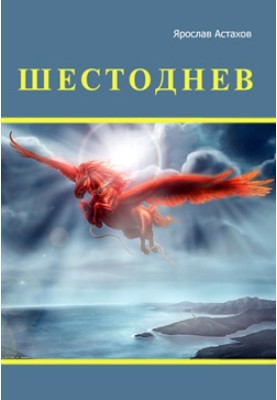Six days
 Instant download
Instant download
after payment (24/7)
 Wide range of formats
Wide range of formats
(for all gadgets)
 Full book
Full book
(including for Apple and Android)
The cover of “Shestodnev” covers poems that were born at very different times. Its old-timers are more than thirty years old. How different the world was then from today. As, indeed, is the “I” of the recorder. (I’m sure that we don’t “compose” real poems - they come. And they allow themselves to be photographed. Or they don’t.) And the new residents of “Shestodnev” are no more than a year old. It is built symmetrically. Six fully completed cycles of nine poems each. The numbers 9 and 6 are reversed twins. According to the Russian Northern Tradition (see the works of Loginov and Violeva), six is the number of the text in general, and nine is the number of sages, poets and theologians. I prefer to call this last number the god Barma - the patron saint of all poets. One of my readers compared - for fun, of course - “The Six Days” with the work of Dante. The “Divine Comedy” of the great Florentine includes, as you know, 3 parts of 33 songs each. Dante specifically notes this in the last song of “Purgatory”: “the account is laid from the beginning.” My work is incomparable not only in its grandeur (this is obvious), but also because I did not count anything, but simply: time passed, and the poems gradually lined up by themselves into stable cohorts. When six times, practically without any intervention from me, they formed nine, I realized that this was a sign and in front of me was a book. (Cycles with a different number of poems were not included in it.) Where did the name come from? One day I opened the book of St. Basil the Great “Conversations on the Sixth Day” and saw that it contained exactly nine of these conversations. And I took this as a sign too. I believe in fate, and in signs, and in general in all sorts of things. But the question remains: doesn’t a poet take on a lot when he names a book of poems in such a way that one feels an allusion to the text talking about the creation of the world? I’m sure: everyone who has a living soul knows - at least something, approximately - about creation of the world. At least - the world of your inner. For those who write poetry, this should be doubly clear. In the Niceno-Constantinopolitan Creed (5th century) God is called the Poet (ποιητ) of earth and heaven. The “days” of my Sixth Day thus represent certain stages, stages of the creation of the inner world. I hope that this creation occurred more by the will of God than by personal arbitrariness. At the very least, I am glad that there are poems that chronicle this mysterious process. God rested on the seventh day, as the Bible says. Tradition tells that the completion of Creation will be the eighth. And the total number of days will then become equal to the number of the life-giving Orthodox cross. That’s why the book “The Sixth Day” has a section “The Beginning of the Eighth Day.” It contains the poem “Chapters from John,” which was approved by the rector of the Moscow Transfiguration Church in Kadyshi. I hope that other poems in the book represent more of a conversation between the soul and God, rather than its reaction to this world.
Data sheet
- Name of the Author
- Ярослав Астахов
- Language
- Russian




















